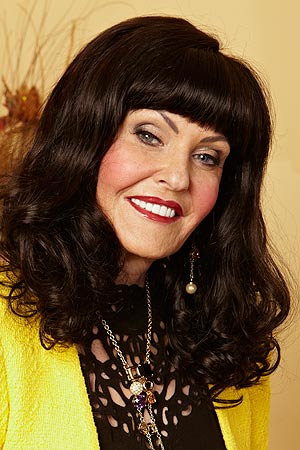Entrepreneurs
Why Hilary Devey Is So Successful
Hilary Devey is a businesswoman, TV personality and entrepreneur from the UK best known for her role on BBC’s Dragons’ Den with Peter Jones.
Hilary continues grow her personal brand by speaking at high profile events around the world and carrying on with her TV work by presenting shows like Channel 4’s The Intern.
Hilary Devey’s Early Life
 Devey was raised in Bolton, England and at the young age of seven saw the unfortunate bankruptcy of her father when his central heating company went under. This difficult time involved bailiffs taking furniture and appliances from their family home. After this, Devey’s father made ends meet by managing public houses, inns and hotels. After leaving school at sixteen, Devey briefly served in the Women’s Royal Air Force before leaving and moving to London. Devey then went on to gain experience in the distribution sector working for Littlewoods, Tibbett and Britten and the United Carrier Network.
Devey was raised in Bolton, England and at the young age of seven saw the unfortunate bankruptcy of her father when his central heating company went under. This difficult time involved bailiffs taking furniture and appliances from their family home. After this, Devey’s father made ends meet by managing public houses, inns and hotels. After leaving school at sixteen, Devey briefly served in the Women’s Royal Air Force before leaving and moving to London. Devey then went on to gain experience in the distribution sector working for Littlewoods, Tibbett and Britten and the United Carrier Network.
She then progressed to work at TNT in the retail distribution sector before she decided to leave and set up her own business.
Hilary Devey’s estimated net worth is $75 Million.
Hilary Devey’s Business
 Through her expanding experience and increasing knowledge, Hilary Devey realised that it was a challenge to transport small consignments of palletised freight at a low price and at a fast pace. She felt that if this situation was tackled immediately it would be a profitable and revolutionary venture within the distribution industry.
Through her expanding experience and increasing knowledge, Hilary Devey realised that it was a challenge to transport small consignments of palletised freight at a low price and at a fast pace. She felt that if this situation was tackled immediately it would be a profitable and revolutionary venture within the distribution industry.
Devey was faced with large obstacles and seemingly insurmountable odds when it came to getting started. The banks refused to help fund her proposed venture and the only way she could finance the start up of the company was to sell her house and her car. Devey maintained incredible belief and determination whilst facing these obstacles head on. The situation was made even more impressive by the fact that she was a single mother at the time. It would have been easy to give up, and I am sure that many would have but Devey pressed on.
In the company’s first year, at Christmas time, she was forced to forfeit her own wage in favour of her staff and she couldn’t even afford a Christmas dinner for her and her son. It was very clear that success was Devey’s only option as she faced obstacle after obstacle and she overcame all of them. It took several months and many knock backs for Devey to secure her first premises and in the late part of 1996, Pall-Ex was born.
“Failure was not an option. It just wasn’t in my vocabulary.” – Hilary Devey
The Growth of ‘Pall-Ex’
 On the first night of business the new company only distributed 117 pallets which is very different when compared with the ten thousand pallets that are now distributed by Pall-Ex every single night. Today, Hilary Devey is an inspirational role model to both male and female entrepreneurs. After starting from absolutely nothing, she now is the CEO of the largest palletised freight distribution network in the UK; boasting a turnover in excess of $100 Million and serving multiple blue chip customers.
On the first night of business the new company only distributed 117 pallets which is very different when compared with the ten thousand pallets that are now distributed by Pall-Ex every single night. Today, Hilary Devey is an inspirational role model to both male and female entrepreneurs. After starting from absolutely nothing, she now is the CEO of the largest palletised freight distribution network in the UK; boasting a turnover in excess of $100 Million and serving multiple blue chip customers.
Pall-Ex delivers to 38 Countries in Europe and serves every single post code in the United Kingdom. It is no exaggeration to say that Hilary Devey and Pall-Ex revolutionised the distribution industry and they have never followed the crowd, maintaining a focus on innovation.
Hilary Devey’s Television Career
 Devey has featured on several TV pprogrammesin the UK, starting with ‘The Secret Millioanire’ in 2008 where she donated $100,000 to The Back Door Music Project and The Syke Community Centre in Rochdale. In the Spring of 2010 Devey became the presenter of The Business Inspector for Channel 5 in the UK. In The Business Inspector, Devey used her experience and expertise to transform struggling businesses so they could operate successfully and turn a profit.
Devey has featured on several TV pprogrammesin the UK, starting with ‘The Secret Millioanire’ in 2008 where she donated $100,000 to The Back Door Music Project and The Syke Community Centre in Rochdale. In the Spring of 2010 Devey became the presenter of The Business Inspector for Channel 5 in the UK. In The Business Inspector, Devey used her experience and expertise to transform struggling businesses so they could operate successfully and turn a profit.
In early 2011 Devey joined the panel of the BBC 2 programme Dragons’ Den, a show that allows budding entrepreneurs to present their business ideas to the panel of wealthy investors. The contestants pitch for financial investment, giving a stake in their company in return. After a successful run on the programme, Devey announced that she would be leaving Dragons’ Den and signing a contract to appear exclusively on Channel 4.
“If you don’t have faith in yourself, then nobody else will have faith in you.” – Hilary Devey
Conclusion
Hilary Devey’s story of overcoming obstacles to become successful is as filled with determination and persistence as any entrepreneurial journey you’re likely to read. Her ability to keep going in the face of adversity and repeated knock backs is inspiring.
Ask yourself what you could achieve if you didn’t take ‘no’ for an answer and literally kept going until you were successful. This is what the remarkable Hilary Devey did and it was the primary ingredient for her success.
An amazing woman with a phenomenal story that teaches us to maintain a success driven focus even when things get extremely tough.
Hilary Devey’s Speech
Business
How AI Agents Can Quietly Expose Your Business to Serious Risk
As businesses race to automate with AI, new attack paths are emerging that put customer data, revenue, and trust at risk.

Model Context Protocol (MCP) is the emerging open standard that lets AI models connect to external tools and data sources. (more…)
Business
Why Smart Entrepreneurs Are Quietly Buying Gold and Silver
When stocks, property, and cash move together, smart business owners turn to one asset that plays by different rules.

You’ve built your business from the ground up. You know what it takes to create value, manage risk, and grow wealth. But here’s something that might surprise you: some of the most successful entrepreneurs are quietly adding physical gold and silver to their portfolios. (more…)
Business
Why Entrepreneurs Should Care About AI Automation Testing
AI automation testing is quietly becoming the unfair advantage behind faster launches, fewer bugs, and startup growth that doesn’t break under pressure.

Faster than ever, the online world pushes entrepreneurs to build sharper tools while moving at full speed. Launching apps, services, or systems? One thing remains clear: fragile code slows everything down. (more…)
Business
Why Smart FMCG Entrepreneurs Outsource What They Can’t Automate
From label mistakes to premium gift sets, manual co-packing gives growing FMCG brands the speed, precision and flexibility in-house teams can’t match.

In the fast-moving consumer goods industry, success isn’t just about having a great product. It’s about speed, efficiency and knowing when to focus your energy on what truly matters. (more…)
-

 News4 weeks ago
News4 weeks agoBrandon Willington Builds 7-Figure Business by Ignoring Almost Everything
-

 Business3 weeks ago
Business3 weeks agoEntrepreneur’s Guide to Pay Stubs: Why Freelancers and Small Business Owners Need a Smart Generator
-

 Business3 weeks ago
Business3 weeks agoThe Salary Shift Giving UK Employers An Unexpected Edge
-

 Scale Your Business3 weeks ago
Scale Your Business3 weeks ago5 Real Ways to Grow Your User Base Fast
-

 Business3 weeks ago
Business3 weeks agoThe Simple Security Stack Every Online Business Needs
-

 Finances3 weeks ago
Finances3 weeks agoWhy Financial Stress Is One of the Biggest Barriers to Personal Growth
-

 Business2 weeks ago
Business2 weeks agoWhy Smart FMCG Entrepreneurs Outsource What They Can’t Automate
-

 Did You Know2 weeks ago
Did You Know2 weeks agoThe SEO Traps Even Experienced Marketers Fall Into




























